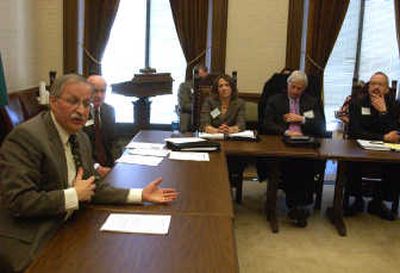Spokane making a name for itself

OLYMPIA – In a large meeting room Thursday, House Speaker Frank Chopp surveyed the crowd.
“Is there any leader left in Spokane?” he asked.
Nearly 80 business, political, higher education and health care leaders have spent much of the week in Olympia, pitching Spokane area priorities.
Gone are the big white “I (heart) Spokane” buttons, the receptions heavy on hand- wringing and the public battles for money from the Legislature.
With paid lobbyists, local lawmakers in key leadership posts and a detailed – and long – wish list in hand, the region has gained clout and scored some big wins in recent years. The group’s evening reception – drinks, shrimp, hors d’oeuvres – was held Thursday night under the crystal chandeliers in the century-old governor’s mansion.
“They’re more sophisticated,” state Rep. Hans Dunshee, D-Snohomish, said. “They’re seeing the realities and saying ‘OK,’ instead of just saying, ‘We want.’ They understand that Spokane’s not the only place on the map.”
“The old model in Spokane used to be ‘I want it because Seattle has it,’ ” said state Sen. Chris Marr, D-Spokane. Now, he said, the region has staked out a claim to key priorities – like health care and higher education – and a more focused wish list of projects.
And with Democrats controlling the House and Senate, he said, it helps that Spokane voters are sending more Democrats to the capital. Senate Majority Leader Lisa Brown – she and Chopp are the two most powerful lawmakers in the state – is a Spokane Democrat.
And numbers are important.
“They bring a planeload,” said Dunshee. “That helps them.”
The results: millions of dollars to renovate the Fox Theater and tens of millions for labs and other buildings at local universities, as well as money for the Mobius science center, Mirabeau Point, University District and a wide variety of community groups. Lawmakers have launched medical- and dental-student training in Spokane, expanded nursing programs, steered more money to schools, and launched economic development programs, like “community empowerment zones.”
“If you ever look at one city that’s benefited because you work together, it’s Spokane,” said House Minority Leader Richard DeBolt, R-Chehalis.
This year’s requests are more modest, which organizer Rich Hadley says is a nod to this year’s short legislative session. Much of the lobbying is intended to lay groundwork.
“We’re not trying to create a huge insatiable appetite in a year that the state is really just trying to tweak its budget,” said Hadley, CEO of Greater Spokane Inc.
Some priorities:
“Talking about ways to kickstart the North Spokane Corridor, a 20-year, $3.3 billion highway that would link U.S. 395 with Interstate 90. Legislators have repeatedly said the region must raise at least some money for the project, and Marr on Thursday urged leaders to promote the project to taxpayers.
“Getting $3 million more for the job skills program, which help provide customized training.
“Having lawmakers agree to Superintendent of Public Instruction Terry Bergeson’s request for $25 million more for school districts.
“And easing the requirements to get state tax breaks in Spokane’s community empowerment zone, intended to economically revitalize low-income areas.
In meetings over several days, lawmakers had several messages back. Among them:
“Spokane residents should expect to pay part of the cost of the corridor project.
“The region should push for a set-aside portion of the state’s Job Development Fund to help combat Idaho’s ability to lure businesses like Cabela’s and Buck Knives.
“Help is on the way for housing. Brown said that lawmakers will act quickly to put cash in a housing assistance program, among other proposals.